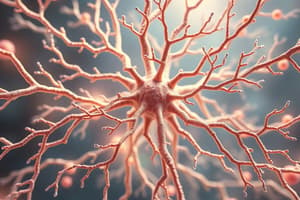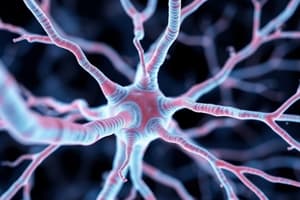Podcast
Questions and Answers
What is the primary function of the diencephalon?
What is the primary function of the diencephalon?
- Processing sensory information
- Controlling voluntary movements
- Coordinating balance and motor skills
- Regulating bodily functions like temperature (correct)
Which structure is NOT part of the hindbrain?
Which structure is NOT part of the hindbrain?
- Pons
- Cerebellum
- Medulla Oblongata
- Thalamus (correct)
What is the role of the cerebellum?
What is the role of the cerebellum?
- Coordinating motor control and balance (correct)
- Integrating visual recognition
- Processing sensory information
- Regulating emotions and memory
The primary somatosensory cortex is associated with which brain region?
The primary somatosensory cortex is associated with which brain region?
Which of the following lobes is primarily responsible for visual processing?
Which of the following lobes is primarily responsible for visual processing?
What separates the frontal lobe from the parietal lobe?
What separates the frontal lobe from the parietal lobe?
Which of the following accurately describes the function of the temporal lobe?
Which of the following accurately describes the function of the temporal lobe?
Which part of the brain is responsible for coordinating balance and fine motor skills?
Which part of the brain is responsible for coordinating balance and fine motor skills?
What is the primary function of the hypothalamus within the diencephalon?
What is the primary function of the hypothalamus within the diencephalon?
Which part of the brainstem is responsible for relaying sensory information and regulating sleep?
Which part of the brainstem is responsible for relaying sensory information and regulating sleep?
Which brain lobe is primarily associated with processing auditory information?
Which brain lobe is primarily associated with processing auditory information?
What is a key function of the cerebellum?
What is a key function of the cerebellum?
Which cranial nerve is responsible for controlling eye movement and pupil response?
Which cranial nerve is responsible for controlling eye movement and pupil response?
Which cranial nerve is solely responsible for the sense of smell?
Which cranial nerve is solely responsible for the sense of smell?
Which part of the CNS is primarily responsible for the regulation of involuntary body functions, such as heartbeat and breathing?
Which part of the CNS is primarily responsible for the regulation of involuntary body functions, such as heartbeat and breathing?
What is the primary function of the precentral gyrus located in the frontal lobe?
What is the primary function of the precentral gyrus located in the frontal lobe?
Which structure is responsible for communication between the left and right cerebral hemispheres?
Which structure is responsible for communication between the left and right cerebral hemispheres?
What function is primarily associated with the medulla oblongata?
What function is primarily associated with the medulla oblongata?
Which cranial nerve is primarily responsible for the sense of smell?
Which cranial nerve is primarily responsible for the sense of smell?
Which part of the brain is primarily involved in fine motor control and balance?
Which part of the brain is primarily involved in fine motor control and balance?
What is the primary function of the thalamus?
What is the primary function of the thalamus?
Which cranial nerve is involved in both sensory and motor functions, particularly in facial sensation and chewing?
Which cranial nerve is involved in both sensory and motor functions, particularly in facial sensation and chewing?
The arbor vitae refers to which structure of the brain?
The arbor vitae refers to which structure of the brain?
Which lobe of the brain is primarily responsible for processing visual information?
Which lobe of the brain is primarily responsible for processing visual information?
Flashcards
Meninges
Meninges
Protective membranes surrounding the brain and spinal cord.
Forebrain
Forebrain
Anterior part of the brain that includes the telencephalon and diencephalon.
Precentral Gyrus
Precentral Gyrus
Part of the frontal lobe responsible for voluntary motor functions.
Postcentral Gyrus
Postcentral Gyrus
Signup and view all the flashcards
Occipital Lobe
Occipital Lobe
Signup and view all the flashcards
Temporal Lobe
Temporal Lobe
Signup and view all the flashcards
Central Sulcus
Central Sulcus
Signup and view all the flashcards
Lateral Sulcus
Lateral Sulcus
Signup and view all the flashcards
What view is needed to see the Longitudinal Fissure?
What view is needed to see the Longitudinal Fissure?
Signup and view all the flashcards
Corpus Callosum
Corpus Callosum
Signup and view all the flashcards
Thalamus
Thalamus
Signup and view all the flashcards
Hypothalamus
Hypothalamus
Signup and view all the flashcards
Pituitary Gland
Pituitary Gland
Signup and view all the flashcards
Midbrain
Midbrain
Signup and view all the flashcards
Pons
Pons
Signup and view all the flashcards
Medulla Oblongata
Medulla Oblongata
Signup and view all the flashcards
What is the purpose of the frontal lobe?
What is the purpose of the frontal lobe?
Signup and view all the flashcards
What is the function of the parietal lobe?
What is the function of the parietal lobe?
Signup and view all the flashcards
What does the occipital lobe do?
What does the occipital lobe do?
Signup and view all the flashcards
What are the functions of the temporal lobe?
What are the functions of the temporal lobe?
Signup and view all the flashcards
What is a neuron?
What is a neuron?
Signup and view all the flashcards
What is the function of the axon?
What is the function of the axon?
Signup and view all the flashcards
What is the function of the dendrite?
What is the function of the dendrite?
Signup and view all the flashcards
What is the purpose of the myelin sheath?
What is the purpose of the myelin sheath?
Signup and view all the flashcards
Study Notes
Human Anatomy & Physiology I - Central Nervous System (CNS)
- Course: BIOL117
- Institution: East Stroudsburg University
- Topics: Introduction to the CNS, Structure & Function of the Brain, Cranial Nerves
Neuron Structure
- Soma (cell body): Contains the nucleus and other organelles
- Neuroplasm: Cytoplasm of the neuron
- Nucleus: Control center of the neuron
- Axon hillock: Cone-shaped region of the neuron where the axon begins
- Axon: Long, slender projection that transmits signals away from the soma
- Dendrites: Short, branching projections that receive signals from other neurons
- Schwann cells: Wrap around axons to form myelin sheaths
- Nodes of Ranvier: Gaps in the myelin sheath
- Meninges: Protective membranes surrounding the brain and spinal cord - Skull: Outermost protective layer - Dura mater: Tough, outer meningeal layer - Subdural space: Space between the dura mater and arachnoid mater - Arachnoid mater: Delicate, web-like meningeal layer - Subarachnoid space: Space between the arachnoid mater and pia mater - Pia mater: Delicate, inner meningeal layer
Regions of the Brain
- Forebrain: Divided into telencephalon and diencephalon
- Midbrain: Mesencephalon
- Hindbrain: Divided into metencephalon and myelencephalon
Brain Lobes
- Frontal Lobe: Precentral gyrus (primary motor cortex), planning, memory, social judgment, critical & creative thinking
- Parietal Lobe: Postcentral gyrus (primary somatosensory cortex), receiving and interpreting sensory information, taste
- Occipital Lobe: Visual center of the brain, depth perception, color, shape, vision recognition
- Temporal Lobe: Hearing, smell, learning, memory, emotion
Sulci/Fissures
- Central Sulcus: Separates the frontal and parietal lobes
- Lateral Sulcus: Separates the frontal, parietal, and temporal lobes
Deep/Mid-Sagittal Structures of Brain
- Corpus callosum: Connects the cerebral hemispheres
- Thalamus: Relay station for sensory information
- Hypothalamus: Regulates homeostasis, endocrine function
- Pituitary Gland: Endocrine gland
Cranial Nerves
- 12 pairs of cranial nerves
- Sensory, motor, or both
- Memorize the functions and whether they are sensory or motor
Important terminology/concepts
- Grey matter: Primarily cell bodies and dendrites
- White matter: Primarily axons
Studying That Suits You
Use AI to generate personalized quizzes and flashcards to suit your learning preferences.




